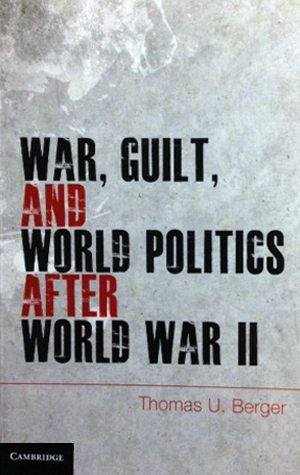When Nations Should, and Shouldn’t, Apologize
CAS professor’s book on how aggressors and victims write history

A nation should apologize when it wrongs another people, right?
Not necessarily, according to Thomas Berger.
While moral considerations should always be taken into account, other factors may make the cost of an apology prohibitive, Berger writes in his latest book, War, Guilt, and World Politics after World War II (Cambridge University Press, 2012). Foreign Affairs magazine named it one of the best books of 2013.
Another head-turning fact his book probes: it’s not just aggressors that try to whitewash past sins. Nations that have been victimized may downplay their past sufferings to achieve other goals.
A College of Arts & Sciences associate professor of international relations, Berger focuses his book on efforts to grapple with atrocities by Germans, Japanese, and Austrians after World War II. Nations create “official” narratives of their past, he writes, but those narratives can be challenged by others, a situation he says is occurring ever more frequently today.
He wrote the book after being told by people in the US government that they didn’t know when and whether nations should make apologies. “I hope that my book is going to be part of an effort to provide the intellectual foundation for understanding this,” says Berger, who discussed the topic with BU Today.
BU Today: When does it make sense for a nation to seek reconciliation with those it has wronged, and when is it too costly to do so?
Berger: There are those who feel it is always right and just to apologize. I’m not a philosopher, though there is an ethical and moral dimension to these questions to take into account. But there are costs. Apologies are not cheap. It is not simply having your leader say, “I’m sorry”; it means a whole set of policies, including compensation, educational policies, commemoration policies, how to remember the past in museums, at cultural sites, and through holidays and events. I call it the official historical narrative of the state.
This requires engagement by the senior policy makers in the country, and anybody that works in government will tell you that is one of the most precious commodities—15 minutes of the president’s time is a whole lot. But apologies are also costly because of the emotion they evoke in your society and that they can evoke in other societies. We cannot address every historical tragedy. For example, the atomic bombs dropped on Hiroshima and Nagasaki, the firebombing in general of German and Japanese cities during World War II—should we apologize for those? Many innocent women and children and noncombatants, old people who had nothing to do with, or may have been opponents of, the Nazi regime, were incinerated. And there’s been a debate in the State Department about whether Obama or another president should go to Hiroshima and make some sort of statement, linking it, perhaps, to a denuclearization program. And the decision has always been that it is too costly. The backlash inside the United States is going to outweigh the benefits and might even undermine the intended effort.
What new forces today are making official versions of history more contentious?
Internationally, the connections between countries have become deeper. We are in a state of what international relations theorists call complex interdependence. At BU, look at our student body. Look at our clothes and trade in terms of our access to media. In other words, we are tied together more and more closely with those of other countries. We have to become more sensitive to their views. This is one of the problems that Japan has had. As they became more integrated in East Asia, beginning in the 1980s, they became more sensitive to views in other countries about their World War II behavior.
Another important element is democratization, or pluralization, of politics. As more groups in society are able to express their views, they push for a different historical narrative. Germany in the 1940s was very much under pressure, economically, politically, geostrategically, to be sensitive to views of victims in democratic countries in particular—France, Holland, Italy, and Israel.

Why are some nations penitent after committing atrocities and others not?
The simplest answer is because they have to, because the costs of ignoring these issues go up. This happened in the United States, going back to the Civil War story, as African Americans were able to get their views out more clearly. People also become persuaded by what they’re hearing. Costs and benefits can’t be measured simply in dollars and cents, or bullets and bayonets. They can also be measured in these sorts of moral and emotional terms.
By contrast, Austria for many years had sort of the Sound of Music image, was not forced to deal with its Nazi past, and therefore arrived at an impenitent narrative. Don’t forget, Hitler was Austrian. At the end of my chapter on Austria is the joke that Austria’s greatest accomplishment of the 20th century was to convince the world that Beethoven was Austrian and Hitler was German. The reverse of course is true. Austria maintained that image into the 1990s, but it was becoming more costly, with questions about Austrian politicians such as Kurt Waldheim, who’d served in Hitler’s military and was elected Austrian president in 1985. Austria began to negotiate to enter the European Union, and the European Union made it very clear that one of the important conditions to join was that they address their past in this sense, that they develop a different historical narrative, and Austrians did it.
Why would nations that have been victimized downplay that past?
In the case of China, they were seeking to court Japan during the earlier phases of the Cold War. They believed that Japan was the most powerful country in East Asia. Both China and Taiwan were trying to get Japanese support. The Chinese prime minister propagated a narrative rooted in Marxist ideology: there had been a militarist elite in Japan, part of a broader, industrialist, capitalist, bourgeois, international conspiracy, who had oppressed not only the Chinese people, but the Japanese people as well. And so the Chinese and the Japanese should therefore fight against the archenemy, the United States. Japanese atrocities, such as going berserk in Nanjing or wiping out entire villages, were deliberately suppressed. It wasn’t until the 1980s that China began to recognize things like the Rape of Nanjing.

Comments & Discussion
Boston University moderates comments to facilitate an informed, substantive, civil conversation. Abusive, profane, self-promotional, misleading, incoherent or off-topic comments will be rejected. Moderators are staffed during regular business hours (EST) and can only accept comments written in English. Statistics or facts must include a citation or a link to the citation.